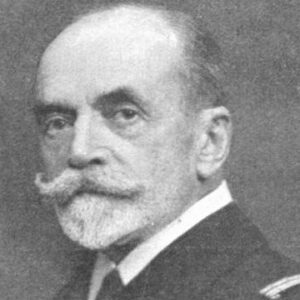During World War I, Admiral Anton Haus was the Commander in Chief of the Austro-Hungarian Navy. He was a well-known naval strategist who believed that rather than risky offensive actions, it was better to use his fleet as a deterrent to the Allies. He taught at the Naval Academy in Fiume early in his career and wrote the important textbook Oceanography and Maritime Meteorology. Before World War I broke out, he was the Austro-Hungarian envoy to the second Hague Peace Conference in 1907. Despite the fact that he led several heavy strikes with his fleet, he preferred to leave the active fighting to light troops such as submarines and destroyers. He was well-known for his support for unrestricted submarine warfare. He rose through the ranks to Vice Admiral in 1907, Commander of the Navy in 1913, and Grand Admiral in 1916, a position he held until his death a year later. For his actions, he got multiple accolades and medals, including one posthumously.
Childhood and Adolescence of Anton Haus
Anton Haus was born on June 13, 1851, to a Slovenian-speaking family in Tolmein, Slovenia (now Tolmin). There isn’t much known about his youth or life before he entered the military.
A Career of Anton Haus
In 1869, Anton Haus enlisted in the Navy. Several shore posts followed, including two teaching positions at the Naval Academy in Fiume and the Naval Torpedo School.
During his time at sea, he commanded a corvette in an international force dispatched to China in 1900-1901 to put an end to the Boxer Rebellion. He stayed in Beijing for a year after the insurrection was put down.
After being promoted to Vice Admiral in 1907, he was the Austo-Hungarian delegate at the Second Hague Peace Conference.
In 1912, he was elevated to Fleet Inspector with the support of his patron, Archduke Franz Ferdinand, and a year later to Navy Commander and Chief Commander of the Naval Section of the War Ministry.
He was an outspoken supporter of naval expansion. He worked on many naval development plans and pushed naval company with the country’s Triple Alliance with Italy and Germany before to the war.
He was best recognized during the war for assuming a strategic defensive position with the country’s outmanned Navy. Submarines, fast cruisers, and destroyers were used to fight the naval war under his command. Despite Germany’s disapproval, this approach successfully tied down the Alliance naval force throughout the conflict.
Except for the Army Chief of Staff, he was promoted to Grand Admiral after the war, making him the sole high-ranking figure still serving. He remained in this post until 1917, when he died.
Major Projects of Anton Haus
In 1891, while lecturing at the Naval Academy, Haus published Oceanography and Maritime Meteorology, a highly influential textbook.
Achievements & Awards of Anton Haus
He was elevated to Fleet Inspector in 1912, then Commander in Chief and Navy Commander in 1913, thanks to the Archduke’s support.
In 1916, he was appointed to Grand Admiral as a result of his successes and achievements during the war.
Emperor Karl I bestowed the title of Commander of the Military Order of Maria Theresa on him posthumously.
Personal History and Legacy
Anton Haus died of pneumonia on February 2, 1917, in Pola, Croatia, after a distinguished career in the Navy. He was 66 years old at the time.
When Pola was returned to Italy after WWII, his remains were excavated and transferred to Vienna in 1925.
After Haus’ death in 1917, Maximillian Njegoven took over as both Fleet Commander and Navy Commander.
Karl Kailer von Kagenfels was appointed to the position of Chief of the War Ministry’s Naval Section.
After 1918, the fleet that Haus had maintained during the war was divided among the winning states.
Estimated Net Worth
Anton Haus’s net worth and salary: Anton Haus is a War Hero with a $12.5 million net worth. Anton Haus was born on the 13th of June, 1851. During World War I, he was the fleet commander and Grand Admiral of the Austro-Hungarian Navy.
Trivia
The Alliance wanted the Austro-Hungarian naval to execute a high-risk offensive against the enemy during the war. He refused, knowing that the outmanned fleet would be overwhelmed by France’s larger force. The navy would not have fared as well as it did if it hadn’t been for his defensive strategy, especially after Italy switched sides.


